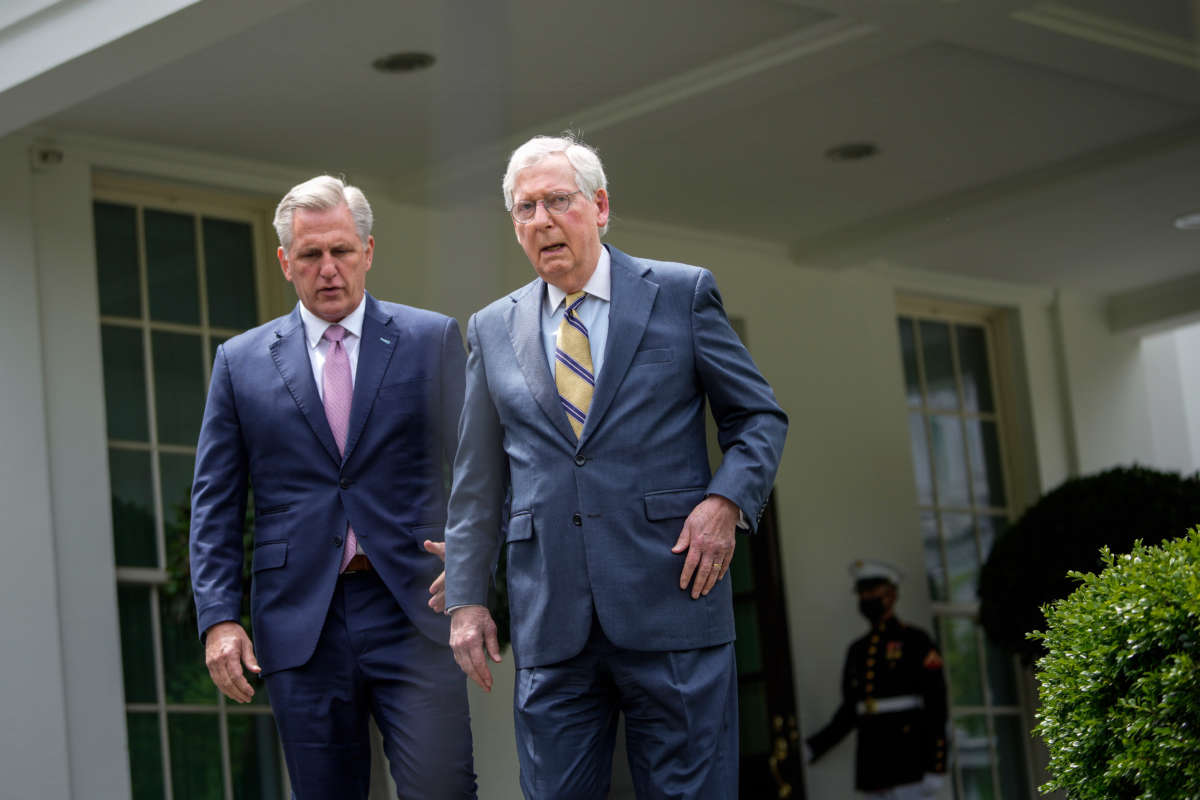Honest, paywall-free news is rare. Please support our boldly independent journalism with a donation of any size.
An upcoming book from New York Times journalists provides new background on how Republican leadership — namely, House Minority Leader Kevin McCarthy (R-California) and now-Senate Minority Leader Mitch McConnell (R-Kentucky) — backed down from their initial criticisms of former President Donald Trump following the attack on the U.S. Capitol building by a mob of his loyalists.
Publicly, both McCarthy and McConnell’s treatment of Trump in the aftermath of the attack on January 6, 2021 — and how they both stepped away from their initial reprovals of the former president — have been well-documented. But excerpts from the book, “This Will Not Pass: Trump, Biden and the Battle for America’s Future,” written by New York Times reporters, provide new insights into how close both Republican leaders were to demanding Trump’s resignation and supporting his impeachment.
During a meeting with House GOP leaders, for example, immediately after the Capitol attack, McCarthy said Trump’s actions that day were “atrocious and totally wrong.” He also acknowledged that Trump had “incit[ed] people” to attack the Capitol in order to disrupt the certification of the 2020 presidential election, which President Joe Biden won.
“I’ve had it with this guy,” McCarthy told Republican leadership, according to accounts given to the book’s authors.
Trump’s remarks before the attack took place were “not right by any shape or any form,” McCarthy said during the same phone call, questioning how Congress should respond to what the former president had done. After considering and then dismissing the use of the 25th Amendment, McCarthy told his colleagues, on a separate call on January 10, that he’d personally recommend that Trump resign before his term was set to end.
“What he did is unacceptable. Nobody can defend that and nobody should defend it,” he told his fellow Republicans.
But after it became clear that the majority of Republicans in the House did not share the same opinion, McCarthy backed down from his original statement. Indeed, later that same month, McCarthy posed for a photo-op with Trump at his Mar-a-Lago estate.
“Exactly 17 days after [his January 10 conversation], McCarthy was in Palm Beach to demonstrate his continued fealty,” S.V. Dáte, White House correspondent for HuffPost, said on Twitter, sharing an image of McCarthy at Trump’s estate. “When having to choose between democracy and Trump, [McCarthy] chose Trump.”
Exactly 17 days after this, McCarthy was in Palm Beach to demonstrate his continued fealty.
When having to choose between democracy and Trump, he chose Trump. https://t.co/H4vx9lS9F4 pic.twitter.com/IuA0fpfIRX
— S.V. Dáte (@svdate) April 21, 2022
McConnell also expressed support for taking action against Trump in private conversations with his colleagues. While meeting with two advisers on January 11, just five days after the attack, McConnell predicted that Democrats would solve the issue by impeaching Trump.
“The Democrats are going to take care of the son of a bitch for us” through impeachment, he said.
McConnell also told his adviser that he expected the Senate to convict Trump in the subsequent impeachment trial — and that there were enough GOP senators to do so, hinting that he, too, could cast such a ballot. Afterward, he said, Congress could vote to bar Trump from being able to run for office ever again.
“If this isn’t impeachable, I don’t know what is,” McConnell said.
But like McCarthy, McConnell ultimately pulled back his criticisms of Trump, voting with most in his party to acquit the former president in his impeachment trial the next month. After the vote, McConnell was asked in a Fox News interview whether he’d back Trump again should he run for president in 2024.
“Absolutely,” the senator said.
Press freedom is under attack
As Trump cracks down on political speech, independent media is increasingly necessary.
Truthout produces reporting you won’t see in the mainstream: journalism from the frontlines of global conflict, interviews with grassroots movement leaders, high-quality legal analysis and more.
Our work is possible thanks to reader support. Help Truthout catalyze change and social justice — make a tax-deductible monthly or one-time donation today.
